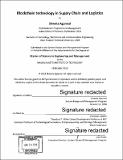Blockchain technology in supply chain and logistics
Author(s)
Agarwal, Shweta, S.M. Massachusetts Institute of Technology
DownloadFull printable version (10.06Mb)
Other Contributors
Massachusetts Institute of Technology. Integrated Design and Management Program.
Advisor
Christian Catalini.
Terms of use
Metadata
Show full item recordAbstract
Blockchain technology is a peer-to-peer infrastructure based on distributed databases and smart contracts as the business logic. The distributed ledger technology eliminates the need for intermediaries disrupting the ownership model. It can have a tremendous impact on cross-organizational process automation when combined with other innovative technologies such as machine learning and additive manufacturing. Over the past few years as the blockchain technology concept has increasingly attracted many industries. The logistics and supply chain management industry have also realized its potential applications in enabling transparency, efficient information sharing, and food safety. Several companies have identified possible use cases that could benefit from blockchain over existing IT solutions. Thesis report provides an overview of current state of blockchain adoption, its technology architecture, review of how blockchain technology and smart contract works, and the benefits and challenges involved. Further, provided a deep dive into the problem of food safety, and the food supply chain and logistics ecosystem drivers. Highlighted, the current use cases of blockchain technology in supply chain and logistics along with critical success factors that companies consider essential for blockchain technology adoption. In the interviews conducted, digital innovators and senior executives are fairly positive about the blockchain technology and its benefits. However, factors such as under-developed ecosystem, lack of governance model and regulatory uncertainty impact its adoption. The proposed framework consists of a hybrid architecture of private and public blockchains, enabling immutable record sharing and monitoring while maintaining selective data privacy.
Description
Thesis: S.M. in Engineering and Management, Massachusetts Institute of Technology, System Design and Management Program, 2018. Cataloged from PDF version of thesis. Includes bibliographical references (pages 92-99).
Date issued
2018Department
Massachusetts Institute of Technology. Engineering and Management Program; Massachusetts Institute of Technology. Integrated Design and Management Program.Publisher
Massachusetts Institute of Technology
Keywords
Engineering and Management Program., Integrated Design and Management Program.